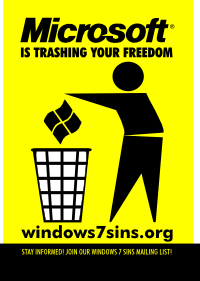Should open source hate Apple?

Apple is not the dominant computing platform.
It's true that Apple is just as proprietary a company as Microsoft. Some might say more so. But there is a big difference between competing with proprietary products and holding a monopoly with them which you use to keep open source down.
There is a reason that history records a case called U.S. vs. Microsoft. Microsoft has both a monopoly and a proven record of using its power to keep open source from gaining a foothold.
Apple, meanwhile, has just a 10% share of the operating system market. Sure, if they had more they might be dangerous, just like if I looked like Antonio Banderas I might be a movie star.
Microsoft did not really change its tune after the court case wound down.
- Microsoft subsidizes the channel so every PC in the store runs Windows, even netbooks where that's more trouble than it's worth.
- Sharepoint is designed specifically to extend its monopoly.
- Remember the OOXML standards battle, where Microsoft corrupted the standards process itself to maintain control of the applications market?
- The Novell deal, in which Linux vendors admit that 2+2=5 so Microsoft won't assert non-existent patent claims against them, still gets me mad every time I think about it.
Now it's true that Apple supports Digital Rights Management (DRM), and limits what users can do. The Free Software Foundation is dead set against DRM. But this was the industry's price for even letting Apple offer a product like the iPod.
The music industry's reaction led to Apple offering to forego DRM and may be the biggest victory open source won in this decade.
Or take the iPhone. Sure it's designed to enforce AT&T's control of bits, and in so doing enforce Apple's control of what you do with the device. But it's the Apple-AT&T relationship that is objectionable. The handset market is increasingly competitive.
The whole idea that the Free Software Foundation should go against Apple rather than Microsoft, then, is a straw man. Apple may want the control over users and markets that Microsoft has enjoyed this decade, but it doesn't have that control, nor is it likely to achieve it.
